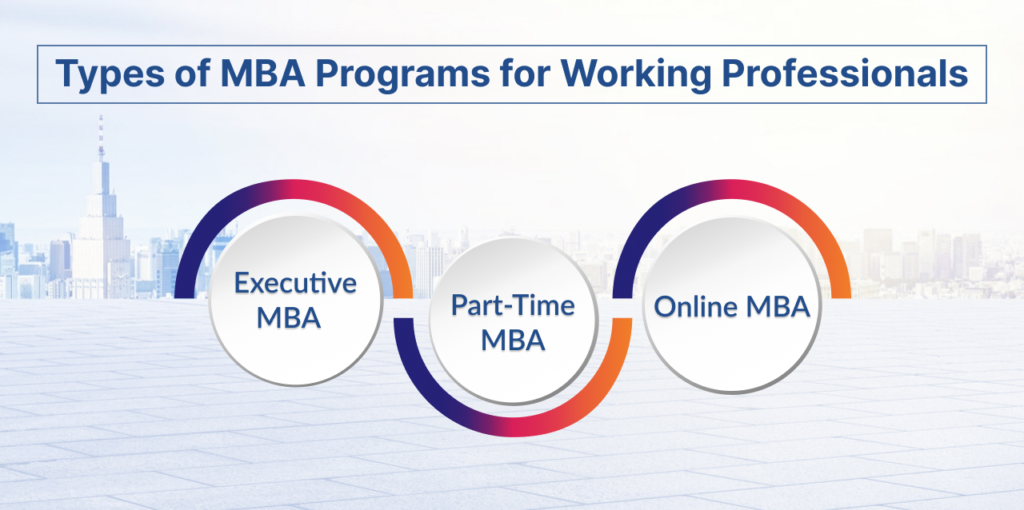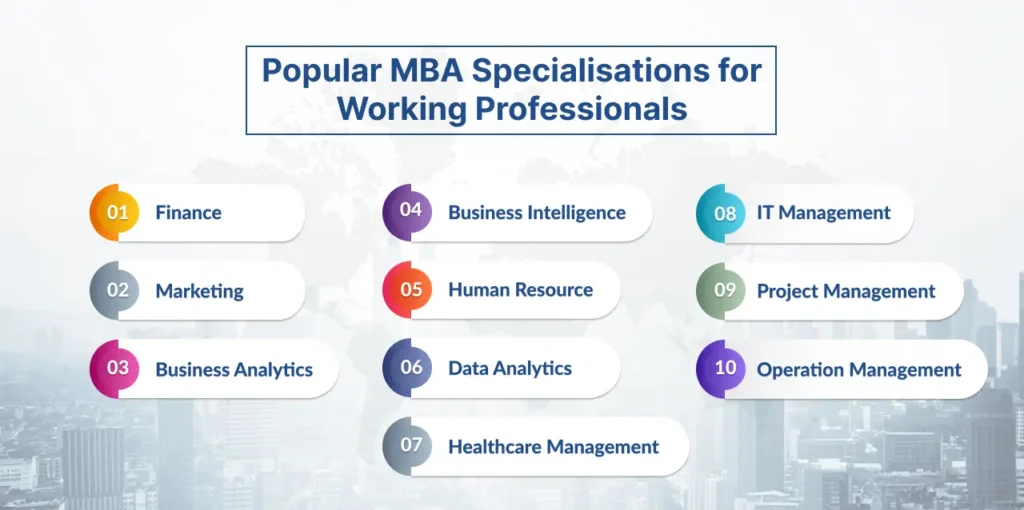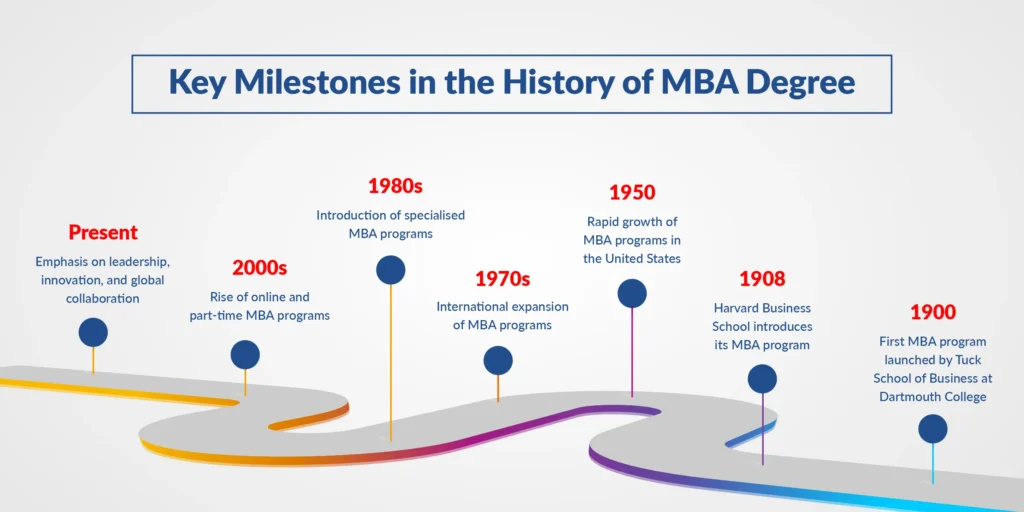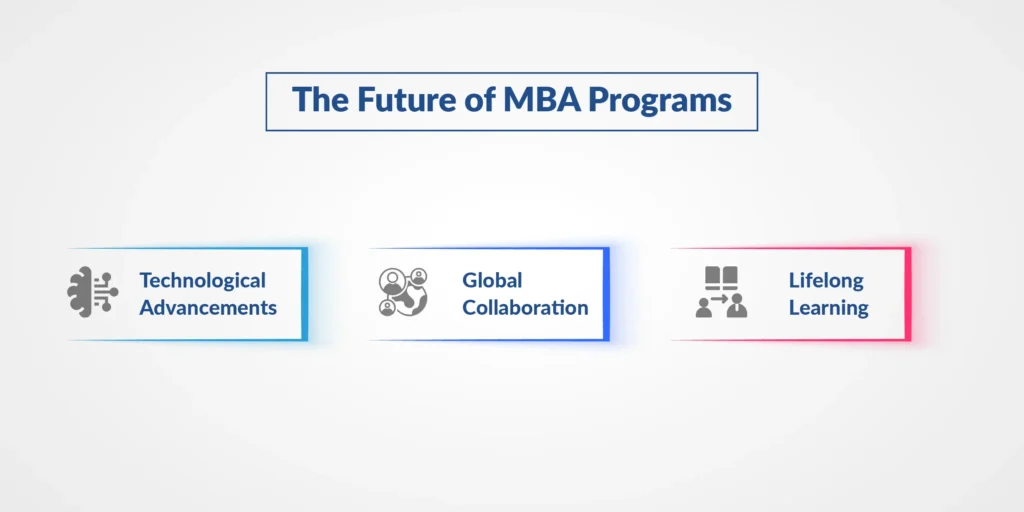MBA Programs for Working Professionals: Types, Specialisation, Colleges, & More
In the fast-paced digital era, education has evolved to cater to the needs of ambitious working professionals like you. An MBA program could be the perfect fit to boost your qualifications while maintaining your professional commitments. These programs offer many benefits and career opportunities, simplifying the lives of many professionals by providing specialised courses that can significantly shape their careers.
In today’s world, MBA programs for working professionals offer many practical benefits, including flexible schedules, leadership development, and the potential for higher salaries. This blog will explore how these programs can empower you to make a significant difference in your career trajectory.
Types of MBA Programs for Working Professionals

- Executive MBA– This one-year program is designed for professionals already ahead in their careers who want to upgrade their educational qualifications for better business knowledge, salary potential, and advanced skills.
- Part-Time MBA– In an institution, it is generally called an evening or weekend class that provides contemporary learning. It is designed for working professionals who want to advance their careers while doing their jobs.
- Online MBA– This program is conducted entirely online and covers the whole syllabus of a traditional MBA. It offers flexibility and a convenient learning mode, allowing aspirants to study without hindering personal commitments.
| Parameters | Executive Year MBA | Part-Time MBA | Online MBA |
| Eligibility Criteria | Bachelor’s degree with a minimum of 50% marks in any discipline. | Bachelor’s degree in any stream from a reputed institute with at least 50% of the score. | Bachelor’s degree in any subject with up to 50% of marks. |
| Duration | 12 to 18 months | 2 to 3 years | 2 years |
| Required Entrance | GMAT, CAT, GRE, etc. | XAT, CAT, MAT, CMAT, GMAT, etc. | Depends on the university’s eligibility criteria. |
| Work- Experience | 2 to 5 years | 2 to 4 years | 2 to 3 years |
| Fees (INR) | 4,00,000 to 25,00,000 | 80,000 to 6,00,000 | 30,000 to 3,00,000 |
| Mode of Learning | Regular online classes, evening or weekend classes | Evening or weekend classes | Online classes |
Pros and Cons of MBA Programs for Working Professionals
An MBA program is a sought-after career and is highly demanding in the business world. Earning an MBA degree is like a jackpot for many aspirants who want to enhance their careers and develop much-needed leadership and managerial skills to build professional growth.
This degree is highly valued in the job market and can significantly boost your career. Let’s look at some of its key advantages and disadvantages:
Advantages of the MBA Programs for Working Professionals
- Skill Development: The MBA program helps working professionals understand their core subjects and gain in-depth skills to expand their marketing, accounting, and finance knowledge. Additionally, it equips them with leadership, strategic thinking, and management skills, which are highly valued in today’s competitive job market.
- Flexible Mode: One of the key advantages of MBA programs for working professionals is their flexibility. You can choose the learning mode that suits your schedule, whether regular online classes, evening or weekend classes, or even entirely online. This flexibility empowers you to learn at your own pace without the stress or difficulty of balancing work and study.
- Career Advancement: The MBA program is not just a degree, it’s a stepping stone to a brighter future. It equips you with the knowledge and skills needed to excel in various fields like healthcare, finance, operations, sales, management, and analysis. This diverse skill set opens up a world of potential career opportunities, allowing you to align yourself with the current job market and potentially earn a higher salary.
- Personal Growth: Enrolling in MBA programs for working professionals is not just about gaining a degree; it’s a transformative journey of personal growth. It’s about building your confidence, honing your leadership skills, and gaining a deeper understanding of the business market. With an MBA degree, you open doors to exciting career opportunities that motivate you to reach new heights.
Disadvantages of MBA Programs for Working Professionals
- Time Commitment: As a full-time employee, your biggest concern is time management, which can become challenging if you cannot handle it. Before applying for an MBA program, prepare yourself for its side effects, which come with its advantages. It might look feasible, but juggling your job and studies is the task.
- High Cost: Obtaining an MBA program can be costly, and it might require additional tuition fees that are not affordable for many working professionals. Financial issues can hinder their study and work, making it complicated to advance their careers. However, an online MBA costs much less than a traditional MBA, so plan your budget and choose wisely.
- Lack of Classroom Training: MBA Programs for working professionals can cease peer-to-peer interaction and limit interaction with faculty members. Pursuing an MBA degree while working becomes difficult to manage, which is the biggest challenge. It also limits your knowledge of the chosen specialisation.
- Ever-changing Job Market: Digitalisation is evolving in the business market, and the demand for MBAs can vary depending on market and economic conditions. Market trends can fluctuate hugely, impacting an MBA holder’s ability to progress with his degree. To overcome this, aspirants should research and opt for a college that offers an MBA curriculum that aligns with market trends.
Popular MBA Specialisation for Working Professionals

MBA provides diverse specialisations which can impact your career for a lifetime. Here are the top MBA specialisations to consider for working professionals:
- Marketing: In this specialisation, you will learn to oversee the marketing campaign and manage all social media work. It covers significant topics like consumer behaviour, digital marketing and brand management.
- Finance: Learning the financial investment and resources to analyse the company’s profit and loss. The candidates also learn to make strategic decisions to ensure the company’s financial health.
- Business Analytics– Analysing data to make informed decisions for the organisation’s welfare. In this specialisation, the aspirants learn to optimise market trends and data-driven decisions for the business market.
- Business Intelligence– Collecting and analysing data for better insight to make informed decisions.
- Human Resources– This specialisation involves managing the workspace, overseeing employee relations, and hiring authentic employees to support the organisation’s growth and success.
- Healthcare Management– Managing the business side of healthcare that deals with patient care, operation systems, and financial efficiency.
- Data Analytics– Using statistical tools, this specialisation extracts data to uncover trends and patterns.
- IT Management– This specialisation deals with all the IT functions and supports the operation systems.
- Project Management– The process of project execution and reaching its absolute result is the goal of learning this specialisation that prepares you to complete the target on time before meeting the deadlines.
- Operation Management– The process of optimisation and designing to deliver efficient production of goods and services.
Best Colleges for MBA Programs for Working Professionals
In India, several MBA programs are available for working professionals who want to hone their skills, apply to industry-based organisations, and improve their careers. Here is the list of top MBA colleges to consider:
Courses | Top MBA Colleges for Working Professionals |
Executive MBA |
|
Part-Time MBA |
|
Online MBA |
|
MBA Programs For Working Professionals: Potential Job Roles and Salary
| Job Role | Average Salary (Annual) |
| Marketing Manager | INR 14,00,000 |
| Finance Manager | INR 16,00,000 |
| Human Resource Manager | INR 10,00,000 |
| Business Analyst | INR 9,00,000 |
| Business Intelligence Analyst | INR 8,00,000 |
| Operation Manager | INR 11,00,000 |
| Project Manager | INR 10,00,000 |
| Sales Manager | INR 12,00,000 |
| Management Consultant | INR 24,00,000 |
| Data Analyst | INR 9,00,000 |
Conclusion
MBA programs for working professionals have a promising future scope and demand. As digitalisation continues to shape the careers of aspirants, enrolling in an MBA program will help you build your educational pathways and job lives. The skills and knowledge gained during an MBA course prepare you for an industry-based job role and help you establish a better career.
To learn more about the program, please visit Hike Education, an ed-tech platform that helps broaden your education horizon.
MBA Programs For Working Professionals : FAQs
Q1. What is the difference between a part-time and executive MBA?
A part-time MBA is designed especially for professionals at various career stages who prefer classes during the evening or weekend.
An executive MBA is for those ahead of their careers and want to pursue further education to build leadership or managerial skills.
Q2. Which MBA Course is best for Working Professionals?
A working professional should opt for executive management of business administration that allows you to take a break from your career and pursue a full-time executive MBA program. However, someone who wants to pursue their career while doing an MBA can also opt for an Online MBA.
Q3. Which MBA is most in demand?
Some of the most in-demand MBA specialisations are- Finance, Marketing, Information Technology, and Operations.
Q4. Is MBA programs for working professionals worth it?
Indeed. Working professionals can pursue an MBA program to advance their careers while learning leadership and management skills to enhance their knowledge.
Q5. How can I balance work, study, and personal life while pursuing an MBA?
Traditional MBA programs require a practical time commitment to balance work, study, and personal life. Aspirants must choose the right specialisation that aligns with their daily schedule and responsibilities. However, professionals who want to balance studies and work can also opt for an online MBA program.





















.png)

.png)




